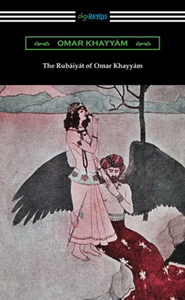Take a photo of a barcode or cover
Although I acquired this beautiful book many years ago, I've at long last taken the time to thoroughly read the verses and studied the beautiful color illustrations and line drawings done by Rene Bull. Omar Khayyam was a 12th century Persian poet, astronomer and mathematician with a philosophy with a joyful acceptance of all that life can bring. Translated into English by Edward Fitzgerald it was first published in 1859 of only 200 copies, It wasn't until years later that one of these publications was found in a "four penny" box by Dante Gabriel Rosetti in London in front of a publishing house. It was indeed good fortune that the work was discovered and today we can enjoy countless copies and many illustrators versions. Mine is done by Rene Bull and he excelled in the style know as "Art Nouveau Style" which is one of my very favorite styles of art.
mysterious
reflective
slow-paced
Plot or Character Driven:
N/A
Strong character development:
N/A
Loveable characters:
N/A
Diverse cast of characters:
N/A
Flaws of characters a main focus:
N/A
hopeful
reflective
fast-paced
Plot or Character Driven:
N/A
Strong character development:
Complicated
Loveable characters:
Complicated
Diverse cast of characters:
Complicated
Flaws of characters a main focus:
Complicated
Key takeaway: Life is fleeting so drink lots of wine.
This was lovely poetry, maybe a bit too much drinking for my taste, but beautiful.
I read this because I keep reading things where writers, in many time periods, praise it.
I was amazed at how familiar it was. Not only were the ideas and bible references comfortable to me, but there were several stanzas that I know I have read or had read to me before. It was like the first time I watched Wayne's World. I kept saying, "Oh, this is where that line comes from." (Beyond that, this book has little in common with the movie Wayne's World.)
I will read this again. It is pleasant, poetic and thought provoking, without leaving me feeling too depressed, sort of like a jaunt through Ecclesiastes.
My edition came with an introduction by A.S. Byatt, which I also enjoyed. And it had two versions of FitzGerald's translation, of which I read only the second. I think I may read the first next time, just to spice things up a bit.
Good poetry! Here is one of my favorite examples:
The Moving Finger writes; and, having writ,
Moves on: nor all your Piety nor Wit
Shall lure it back to cancel half a Line,
Nor all your Tears wash out a Word of it.
I read this because I keep reading things where writers, in many time periods, praise it.
I was amazed at how familiar it was. Not only were the ideas and bible references comfortable to me, but there were several stanzas that I know I have read or had read to me before. It was like the first time I watched Wayne's World. I kept saying, "Oh, this is where that line comes from." (Beyond that, this book has little in common with the movie Wayne's World.)
I will read this again. It is pleasant, poetic and thought provoking, without leaving me feeling too depressed, sort of like a jaunt through Ecclesiastes.
My edition came with an introduction by A.S. Byatt, which I also enjoyed. And it had two versions of FitzGerald's translation, of which I read only the second. I think I may read the first next time, just to spice things up a bit.
Good poetry! Here is one of my favorite examples:
The Moving Finger writes; and, having writ,
Moves on: nor all your Piety nor Wit
Shall lure it back to cancel half a Line,
Nor all your Tears wash out a Word of it.
challenging
reflective
slow-paced
Plot or Character Driven:
N/A
Strong character development:
N/A
Loveable characters:
N/A
Diverse cast of characters:
Yes
Flaws of characters a main focus:
No
This was the first poetry book I ever read as a child. I now write poetry.
lighthearted
mysterious
reflective
medium-paced
Drink wine and look at the moon
and think of all the civilizations
the moon has seen passing by.
Powerful verse for when the wolf is at the door. 11C Persian verse which celebrates the ephemeral. This edition which strove to be as literal a translation as possible proved intriguing. It was laden with historical context and delicious footnotes. Despite the grim circumstances this is timeless poetry.
and think of all the civilizations
the moon has seen passing by.
Powerful verse for when the wolf is at the door. 11C Persian verse which celebrates the ephemeral. This edition which strove to be as literal a translation as possible proved intriguing. It was laden with historical context and delicious footnotes. Despite the grim circumstances this is timeless poetry.

